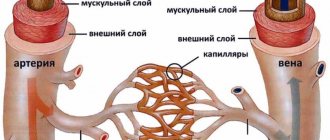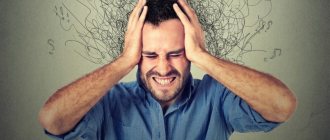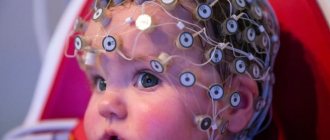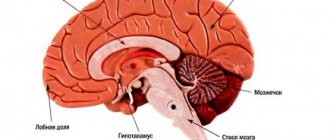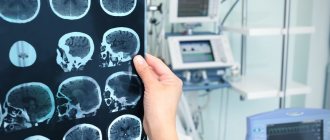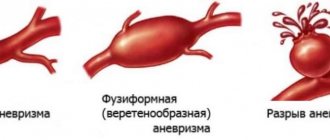General information
Encephalopathy occurs due to metabolic disorders in brain cells. Regardless of the cause, the pathology follows a single scenario. First, there is a decrease in the activity of neurons, then their gradual death. Foci of dystrophy are located throughout the brain, which causes a variety of symptoms.
The damage is irreversible, but with timely consultation with a specialist and quality treatment, the patient’s condition can improve. The remaining intact neurons partially take over the function of the dead cells, and brain function is significantly improved. If the disease was caught at an early stage, the patient retains complete clarity of mind.
Make an appointment
Stages of encephalopathy
The disease has three degrees of severity:
- The first one . There are no external signs, but instrumental diagnostics demonstrate diffuse changes in the brain tissue.
- Second . Brain activity is impaired, but symptoms occur only occasionally.
- Third . Negative symptoms are pronounced. There is a high risk of disability for the patient.
A disease detected at the first stage is more treatable.
Causes
Damage to nerve cells can occur due to exposure to various pathological factors.
- previous trauma;
- acute or chronic intoxication with salts of heavy metals, narcotic substances, alcohol;
- blood supply disorders (atherosclerosis, arterial hypertension, amyloidosis, etc.);
- infectious diseases (diphtheria, botulism, tetanus and others);
- disorders of the liver or kidneys, accompanied by the accumulation of toxins in the blood;
- disorders of glucose metabolism;
- lack of vitamins (especially group B);
- water retention, lack of sodium in the blood and resulting swelling;
- immunodeficiency states;
- exposure to ionizing radiation;
- hypoxia: insufficient oxygen supply to brain cells.
Kinds
Doctors distinguish between congenital and acquired encephalopathy. The first occurs against the background of an abnormal course of pregnancy or childbirth and, often, develops while the fetus is in the womb. Its signs are detected immediately after birth or appear in the first weeks of life. Neonatologists and pediatricians are involved in the diagnosis and treatment of this condition.
Acquired encephalopathy occurs in adulthood. It is divided into several types depending on the cause of neuronal death:
- post-traumatic: occurs against the background of a traumatic brain injury; often develops within a few years after it and often leads to severe mental disorders;
- toxic: associated with acute or chronic poisoning of the body with alcohol, poisons, narcotic drugs, medicines, salts of heavy metals, etc.; Alcoholic encephalopathy is often distinguished separately within this type;
- metabolic: associated with metabolic disorders in the body; The following subtypes of pathology are distinguished: hepatic: occurs when the liver or biliary tract is damaged;
- uremic: associated with impaired renal function;
- diabetic: is one of the frequent complications of diabetes mellitus, occurs against the background of persistent microcirculation disorders and increased blood viscosity;
- anoxic: develops after clinical death and is associated with oxygen starvation of the brain with the subsequent development of a “metabolic storm”;
- Gaye-Wernicke syndrome: encephalopathy caused by vitamin B1 deficiency;
- pancreatic: is a complication of inflammation of the pancreas;
- hypoglycemic: occurs against the background of a sharp decrease in blood glucose;
- atherosclerotic: develops due to atherosclerosis and thickening of the walls of blood vessels;
Depending on the speed of development of the process, encephalopathy is divided into acute and chronic. The first can develop within a few days or hours, and more often occurs against the background of severe intoxication, trauma, or an infectious process. The chronic process can last for years or decades.
Propolis and onion
To reduce the clinical manifestations of the syndrome, an onion mixture is used. To prepare it, take a medium onion and grate it on a fine grater. Then the juice is squeezed out of the resulting pulp. A spoonful of onion juice is mixed with two spoons of honey. The finished composition is taken one teaspoon before meals three times a day.
Propolis tincture helps to cope with the pathological condition. You can buy it ready-made at the pharmacy or make it yourself. To prepare you will need 50 grams of product and a glass of vodka. Propolis is crushed, poured with vodka and infused for ten days in a dark, cool place. Take a teaspoon of the composition three times a day after meals. The tincture can be diluted or washed down with water.
Symptoms
Signs of encephaloptia depend on the location of the source of destruction, as well as the degree of development of the disease. Most often, patients and their relatives experience the following symptoms:
- headache: can involve the entire head or concentrate in certain areas; the intensity depends on the degree of damage and gradually increases; pain is poorly relieved by taking analgesics;
- dizziness: occurs sporadically, accompanied by loss of orientation in space; Often a person is forced to wait out this condition in bed, since the slightest movement worsens the symptom; the condition is often accompanied by constant nausea and vomiting;
- impairment of cognitive functions: a gradual decrease in the ability to think adequately is a characteristic sign of encephalopathy; a person gradually becomes forgetful, absent-minded, has trouble concentrating on a specific process and has difficulty switching between different activities;
- emotional and behavioral disorders: a person has difficulty controlling his emotions, becomes irritable, whiny, gets excited quickly; as the disease progresses, apathy, depression and complete reluctance to do anything arise;
- increase or decrease in muscle tone; often accompanied by hyperkinesis (trembling in the limbs, obsessive movements, etc.);
- decreased vision and hearing;
- increased weather sensitivity.
In some patients, behavioral disorders predominate, others cease to have normal control of their body; in others, it is mainly the sense organs that are affected. In severe cases, a person requires constant care and supervision of others.
Signs of encephalopathy
Conventionally, all signs of the disorder can be divided into three main groups:
- Neuropsychological . The patient's intellectual abilities decrease. It is difficult for him to focus on anything, and he has difficulty solving simple problems. The person becomes emotionally disinhibited. He has a dominant depressive mood.
- Vegetative . Urination is impaired and problems with speech arise.
- Motor . The step shortens, the gait becomes shaky, the posture becomes unstable.
These signs indicate that encephalopathy should be treated as soon as possible. Delay leads to a worsening of the patient’s condition, so it is unacceptable.
Complications
Complications of encephalopathy are associated with severe and irreversible damage to the brain and represent the extreme extent of the symptoms observed:
- loss of self-care ability due to motor or cognitive impairment;
- dementia: loss of knowledge and skills up to complete collapse of personality;
- loss of vision and hearing;
- severe mental disorders;
- convulsions;
- disturbances of consciousness: stupor, coma;
- death.
Diagnostics
A neurologist is involved in the diagnosis and treatment of encephalopathy. Patient examination includes:
- survey: collection of complaints and anamnesis; it is mandatory to clarify information about previous diseases, injuries, risk factors, the time of the first violations, the rate of development, etc.;
- neurological examination: assessment of reflexes, sensitivity, muscle strength, motor function;
- electroencephalography (EEG): assessment of electrical impulses arising during brain function; allows you to identify signs of epilepsy, inflammation, the presence of tumors, etc.;
- Doppler ultrasound of the vessels of the brain and neck: assesses the quality of blood flow in large vessels, identifies areas of narrowing, assesses the volume of incoming blood;
- rheoencephalography: complements ultrasound, allows you to assess the tone and elasticity of blood vessels, detect blood clots;
- angiography: X-ray examination of blood vessels by introducing a contrast agent into them;
- CT and MRI: allow you to detect foci of sclerosis, tumors, inflammatory foci, consequences of stroke and other structural changes;
- blood tests (general, biochemical): make it possible to evaluate the functioning of the kidneys, liver, pancreas, and identify toxins that can affect the condition of the brain.
If necessary, other tests and examinations may be prescribed, as well as specialist consultations to accurately determine the cause of encephalopathy.
Make an appointment
Herbal infusions
Among effective, time-tested folk remedies, a special place is given to various herbal infusions. Modern doctors recommend the following variations:
- Composition based on strawberry leaves, dried hawthorn (berries) and meadowsweet. All components are mixed in equal proportions. For one-time consumption, a teaspoon of this mixture is brewed with a glass of boiling water, and then infused for three hours. Once ready, all that remains is to strain the resulting mass. Drink this medicine twice a day, half a glass.
- 20 grams of hop cones and valerian root are mixed with mint leaves and motherwort (30 grams each). For a glass of boiling water you will need a teaspoon of this mixture. It is brewed and then the infusion is placed in a water bath for 15 minutes. Then you can filter and then add boiled (or cold) water to restore the original volume. This remedy is drunk three times a day, half a glass.
- This infusion requires many components: one part each of naked licorice, rose petals, rose hips, mordwink, white birch and sweet clover, as well as 2 parts each of raspberries, coltsfoot, horsetail, linden, plantain and oregano, three similar parts of motherwort and 6 parts of marsh cudweed. All components are thoroughly mixed in a container of suitable volume. To prepare an infusion of 2.5 cups of boiling water, you will need a full tablespoon of the prepared mixture. The whole thing is briefly put into a water bath, then cooled and filtered. This remedy is used three times a day shortly before meals.
- 2 tbsp. l. valerian root, 3 tbsp. l. chamomile flowers are mixed with the zest obtained from 1 lemon. All ingredients are thoroughly mixed, then poured into a glass of boiling water. The mixture is set aside for an hour, then you can filter and cool. The finished medicine is drunk 2 glasses at a time, twice a day.
Treatment
The sooner treatment for encephalopathy is started, the greater the chance of stopping the progression of the pathology and restoring full brain function.
First of all, it is necessary to eliminate the cause of neuronal damage:
- adjust blood sugar levels;
- stabilize blood pressure;
- restore the functioning of the liver, kidneys, pancreas;
- reduce blood cholesterol levels;
- remove toxins;
- normalize hormone levels, etc.
Direct treatment of encephalopathy requires the prescription of drugs that improve blood flow in the vessels of the brain and metabolism within the cell. Depending on the cause and extent of the lesion, doctors may prescribe:
- nootropics (Cerebrolysin, piracetam): aimed at enhancing metabolism;
- blood thinners (aspirin, pentoxifylline, etc.): help accelerate blood flow, prevent the formation of blood clots;
- antioxidants: neutralize toxins;
- angioprotectors (Cavinton, nicotinic acid and others): necessary to accelerate blood circulation and metabolism;
- vitamin-mineral complexes, amino acids;
- symptomatic drugs: sedatives, anticonvulsants, etc.
For encephalopathy, courses of treatment are carried out regularly, at least 2 times a year. This allows you to keep the disease under control. The selection of specific drugs and determination of dosage is carried out only by a doctor. There is no single treatment regimen for all patients.
To enhance the effect of drugs, non-drug treatment methods are used:
- physiotherapy (reflexotherapy, electrophoresis, magnetic therapy, laser therapy);
- physical therapy to improve muscle condition and facilitate control over them;
- massage to relax and improve blood circulation;
- acupuncture.
In some cases (with the vascular nature of encephalopathy), it is necessary to resort to surgical treatment:
- elimination of a blood clot from the lumen of blood vessels;
- expansion of narrowed sections of the artery with the installation of a stent that supports the walls in the correct position;
- bypass: restoration of blood flow by creating an alternative path that bypasses the affected area.
Means for eliminating hypertension
With hypertensive encephalopathy, you first need to relieve high blood pressure. For this purpose, medications are taken that can suppress arterial hypertension and keep blood pressure parameters normal.
The doctor finds out what caused the hypertension. If the pathology is caused by diseases leading to fluid retention in the body, extracts of diuretic herbs are used for treatment:
- bearberry;
- horsetail;
- lingonberry leaves;
- mint;
- Melissa.
Herbal extracts are prepared as follows: boil 250 ml of water, add 1 tablespoon of mint or other herb to the liquid. After 30 minutes of infusion, the extract is filtered. Take the medicine 3 times a day, 1 glass. Treatment lasts 1.5-2 weeks. Take a 30-day break.
With prolonged use of diuretics, a water-salt imbalance occurs.
Prevention
Encephalopathy is a complex disease. There is no clear method to prevent its occurrence and eliminate all risk factors. Doctors recommend adhering to the following rules:
- provide yourself with a full daily routine with alternating work and rest, a full night’s sleep;
- minimize stress;
- eat properly and balanced, avoid overeating and excess body weight;
- ensure sufficient supply of vitamins and microelements;
- quit smoking, drugs, alcohol;
- exercise in moderation (not professionally);
- promptly identify and treat chronic diseases: hypertension, diabetes, atherosclerosis;
- consult a doctor at the first signs of trouble.
Treatment at the Energy of Health clinic
Doctors at the Health Energy Clinic are always ready to see patients of any age. We will conduct a thorough examination, identify possible causes of encephalopathy and take all measures to eliminate it:
- we will prescribe the most appropriate therapy, describe the course of treatment and the frequency of its repetition;
- We will carry out all the necessary manipulations (placement of a drip, intravenous and intramuscular injections) in the comfortable conditions of a day hospital and manipulation room;
- We will complement the therapy with modern physiotherapeutic procedures;
- We will conduct a massage course and prescribe exercise therapy for maximum effectiveness.
Our neurologists will monitor the patient’s condition and adjust treatment if necessary. Treatment of encephalopathy is a long and complex process, but we are ready to take on it.
Advantages of the clinic
If you require a full examination and high-quality treatment, welcome to the Health Energy clinic. Here you are waiting:
- experienced specialists who regularly improve their skills to keep abreast of all new trends in the world of medicine;
- modern diagnostic equipment;
- everything necessary for physiotherapy, massage, exercise therapy;
- own day hospital for slow drip administration of medications;
- affordable prices for all services.
If you or your relatives have signs of encephalopathy, do not delay contacting a doctor. The sooner treatment is started, the better the result. Sign up for the Health Energy clinic and let our doctors choose the optimal therapy.
Remission
Remission is a period when the symptoms of encephalopathy do not appear. The person begins to feel healthy.
In order for it to last as long as possible with encephalopathy, it is necessary to strictly follow all medical prescriptions and take prescribed medications. During the period of remission, the patient should under no circumstances relax, as this will lead to an exacerbation and rapid progression of the disease.


